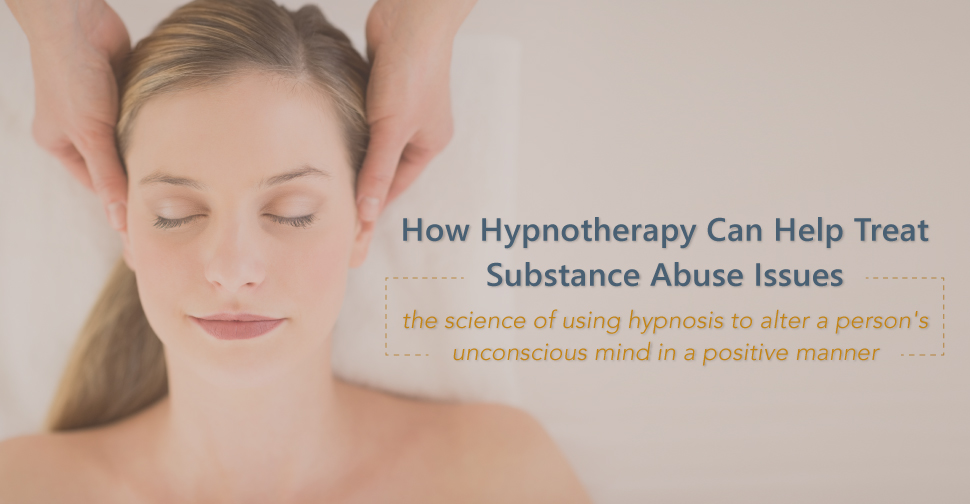
Overcoming addiction is a lifelong struggle and one that takes a lot out of a person. People have to fight against the urge to use likely every day, and sadly that fight is often lost. However, many people are turning to hypnotherapy in their fight against the rigors of drug addiction.
This might sound like a far fetched scenario from a silly B-movie, but it is actually a respected scientific way to beat addiction. Understanding this treatment method can help you decide if it is right for you or if another alternative therapy approach is more appropriate.
What Is Hypnotherapy?
Hypnotherapy is the science of using hypnosis to alter a person’s unconscious mind in a positive manner. While it has connection with stage hypnosis, it is a more sustained and focused use of this skill. A hypnotherapist talks to their client, asking about different areas of their life that they want to change. Then the therapist will put the client in a state of hypnosis that relaxes their conscious mind and allows the hypnotist to imprint new unconscious commands and sensations on their mind.
A hypnotherapy session involves relaxation techniques that put the patient in a state of extreme suggestibility. They aren’t asleep or awake, but somewhere between these two. It’s a state in which you are aware of your surroundings, but unable to consciously direct your focus. This opens your unconscious mind to suggestions and makes you more malleable.
There are two types of hypnotherapy: traditional hypnosis and Ericksonian hypnosis. The former involves giving direct commands to the unconscious mind, such as “you no longer feel the urge to use drugs.” This method is the first attempted because it is the easiest to implement. However, some people have difficulty accepting taking orders like this, which is when Ericksonian hypnosis is used.
This method uses the same technique of putting a person into a state of extreme suggestion, but uses suggestions and ideas, rather than direct orders, to alter the unconscious mind. People who are very critical or analytical often struggle with traditional hypnosis, but do well with Ericksonian hypnosis. For example, a therapist may make simple suggestions, like “doesn’t marijuana make you sick to your stomach?” and other allusions to get your mind to react negatively to a situation or impulse.
Does It Actually Work?
The overabundance of silly stage hypnotists often makes people regard hypnotherapy with suspicion. However, hypnotism has been used for thousands of years and is one of the few ancient therapies that scientists have confirmed as being effective. For example, Dr. Michael Yapko of the American Society Of Clinical Hypnosis had this to say about the effectiveness of hypnotherapy:
“Hypnosis works and the empirical support is unequivocal in that regard. It really does help people… but hypnosis isn’t a therapy in and of itself. Most people wouldn’t regard it that way.” What he means by the latter part of that quote is that hypnosis should not be considered a singular treatment technique used by itself. For example, hypnotizing somebody to lose weight is only effective if that person changes their diet and begins exercising.
Hypnosis can only suggest that a person behave in a certain way by making the mind open to these behaviors and preparing it to implement them. However, and contrary to popular believe, it can’t actually force a person to do anything. This is why hypnosis is often considered an alternative or “supplemental” therapy, albeit one that is very effective.
Take, for example, the study published in a 2007 edition of the Journal Of The National Cancer Institute. In this study, it was found that hypnosis helped alleviate post-surgical pain in people. It also helped decrease nausea, fatigue, and discomfort symptoms. Intriguingly, the people in the study also required less sedative during their surgery, which helped the hospital save almost $800 per patient in surgical time and medical procedures.
Can It Be Used For Addiction?
Hypnosis can absolutely be used for addiction treatment, as addiction is primarily a mental health concern. There have been many studies on its effectiveness, and a majority of them have shown positive results. For example, a study entitled “Group Hypnosis Of Drug Addicts” displayed how effective hypnosis was in helping to treat people addicted to opioids. The idea was to decrease the simultaneous use of heroin and other street drugs and to eliminate use completely, if possible.
The method used in the treatment was simple. Ten people who were addicted to opioids were treated for their addiction using hypnosis over a 10-week period. This group was then evaluated three different times for drug use: immediately before the treatment, six months after the treatment, and two years later. They also filled out an exit survey that helped them evaluate the perceived effectiveness of the treatment method.
Their results were incredible: 90 percent of all tested patients completed treatment, 100 percent quit drugs and were still off six months later, and 78 percent were completely clean two years later. This type of effectiveness is remarkable because it isn’t seen using any other singular treatment method. Though the study authors were quick to note that this was just one sample and shouldn’t be used as absolute proof of effectiveness, they were positive about its potential.
In fact, the effectiveness of hypnosis for treating drug addiction was noted as early as 1972 in the study “The Use Of Hypnosis In The Treatment Of Drug Addiction” by B.J. Hartman. In this essay, Hartman examined the various ways that hypnosis and hypnotherapy could be used to help treat addiction. He noted that hypnosis was useful for eliminating withdrawal symptoms, decreasing pain, and helping beat cravings. He stated:
“In conclusion, the use of hypnosis in the treatment of drug addiction shows a great deal of promise. Without the use of a long-range program utilizing hypnosis, the rate of success is around 2%. Success rates in programs employing hypnosis have consistently been between 60% and 70%.” Thankfully, an increase in our understanding of addiction and its treatment has helped increase these success rates even further, making hypnotherapy a powerful alternative treatment.
How Can Hypnotherapy Help Boost The Effectiveness Of Traditional Rehab Methods?
As previously mentioned, hypnotherapy shouldn’t be used as a singular or primary treatment method for addiction. However, the statistics we’ve mentioned seem to indicate it is a powerful supplemental treatment that dramatically increases the effectiveness of rehabilitation techniques. Here are a few ways that it helps treat addiction and boosts the success rate of traditional rehab:
- Soothes your withdrawal symptoms – Withdrawal is a painful proposition for anyone going through rehab, and it often causes many people to continue using. Hypnosis can help alleviate the severity of these symptoms to make them more manageable.
- Alleviates physical and mental pain – Beyond withdrawal symptom pain lies a variety of physical and mental pains that the person in rehab may have been using drugs to treat. Hypnosis can help decrease these symptoms alongside traditional pain treatment methods.
- Adjusts your addictive behaviors – Behavioral adjustment techniques are often necessary to beat addiction. Hypnosis works on the unconscious to change these often deeply-rooted behaviors at their heart.
- Gives you stronger emotional health – Depression and anxiety caused by drug addiction can be treated by focused and sustained hypnotherapy. Treating these problems can make it easier for a person to remain strong and focused in rehab and decrease the instance of co-occurring disorders.
These benefits are one reason why hypnotherapy is so often used as part of dual diagnosis treatment. It is one of the few treatment methods that can simultaneously help both mental health disorders and the pain of addiction.
Hypnotherapy Is Worth Investigating
 As you can see, hypnotherapy offers real benefits in your fight against addiction. It’s something that you should fully understand before committing to because it takes a lot of dedication and an openness to the treatment.
As you can see, hypnotherapy offers real benefits in your fight against addiction. It’s something that you should fully understand before committing to because it takes a lot of dedication and an openness to the treatment.
To learn more about hypnotherapy and other treatment avenues for addiction, please contact us at DrugRehab.org today. Our skilled and highly trained experts will find you the help you need in your fight for sobriety.
Sources
American Psychological Association – “Hypnosis Today” by Brendan L. Smith
The National Hypnotherapy Society – “What Is Hypnotherapy?”
U.S. National Library Of Medicine – “Group Hypnosis Treatment Of Drug Addicts”
Journal Of The National Medical Association – “The Use Of Hypnosis In The Treatment Of Drug Addiction” by B. J. Hartman

